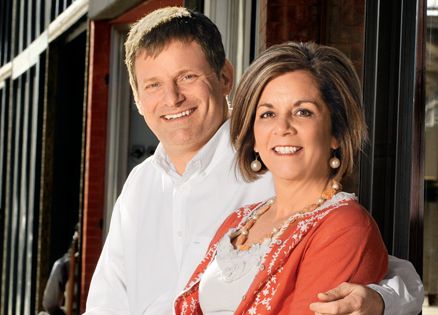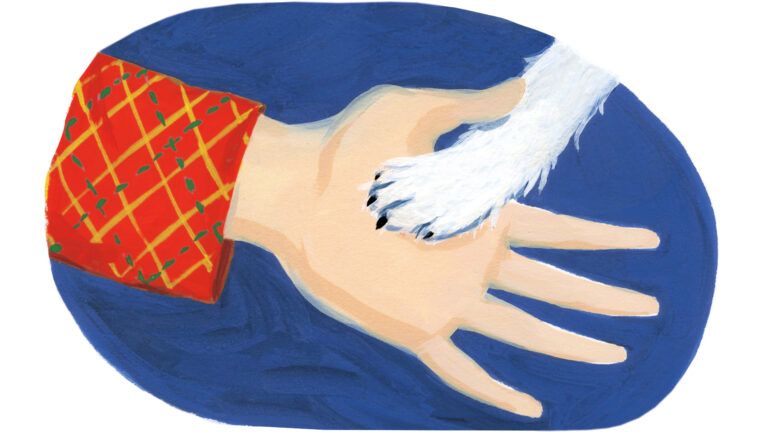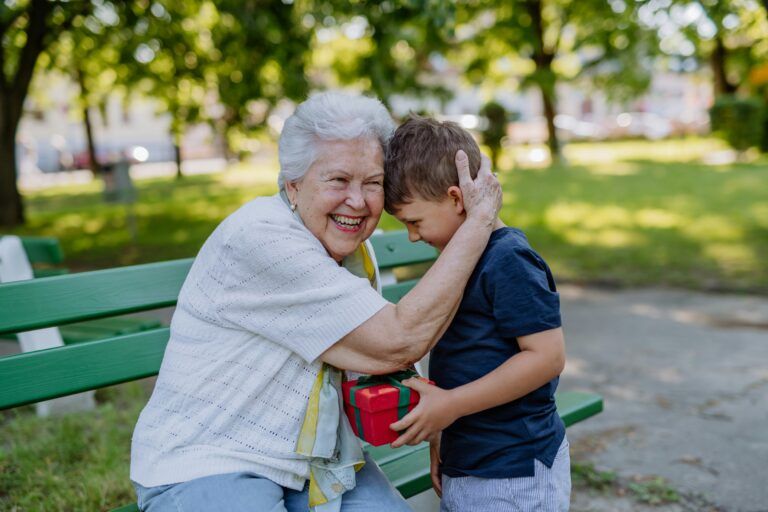I should have been getting ready for church that Sunday morning in May 2011. Our family never missed. But now I just couldn’t do it.
“I’m not going,” I told my husband, Mark. “I can’t say more goodbyes.” I couldn’t bear seeing any more of our former employees leave our town of Trinidad, Colorado. There was nothing I could do to ease their worry and uncertainty. It was beyond frustrating.
I’m an artist, creative. I’m usually full of ideas. I love the challenge, the pride I feel crafting lasting, beautiful objects out of practically nothing and building a business. But this was more than I could manage. I didn’t know how to fix it.
Mark nodded. “It’s okay, Annie. Folks will understand.”
But did they? Really? We’d laid off more than 60 of our 100 employees at Danielson Designs, a custom frame and gift company. Our business had been hit hard by the economic downturn. Our workers were like family. Some of them were family.
Today the congregation was giving a send-off to a couple leaving for Pittsburgh, our former national sales manager and a buyer for our retail store. We hadn’t laid them off. Yet. They’d seen the writing on the wall. But it hurt just the same.
Mark and I were trying everything to turn the business around. We’d launched line after line of new products, even customized frames, inscribed with the customer’s own words. I knew we were as much victims of the economy as anyone.
Still, I couldn’t help but feel responsible. We’d given our employees jobs when there were none to be had, jobs that helped finance houses and cars, send kids to college, save for retirement. And for what? To see it all slip away just like that?
I shuffled into my studio, wanting to be alone. For a long time I stared out the window at the parched red earth as far as the eye could see. We hadn’t had rain in ages, as if nature itself was against us, as if the ground had died.
I ran a sheaf of colored paper through the shredder, then slowly weaved and teased the strips over a small bowl, like a bird’s nest. At least that had been my idea. Now it just seemed like another mess.
I thought of favorite Bible verses and logged onto my computer. “God works all things together for good for those who love him,” I typed from Romans 8:28. Was that really true? These days I wondered. Still, I printed it out.
Maybe there’d be a way to work it in with the colored strips somewhere. Lord, I prayed, Mark and I thought we were following your will. But this is so hard. So many people are struggling. It really stinks.
We moved to tiny Trinidad in 1990 from southern California to be closer to family. It was an old mining town, down on its luck. We wanted to start a business, help the local economy. But what?
I’d been a product developer at a greeting cards company. Mark’s passion was woodworking. We prayed about it. One idea kept coming to us: wooden picture frames adorned with heartfelt words, like a greeting card but more permanent. We made 15 samples. I hand painted each one.
We took them to a retail gift show in Chicago. We came home with hundreds of orders! We needed employees. Lots of employees.
The rush I got hiring our first workers was like nothing I’d ever experienced, young couples dreaming of starting a life together, men laid off from the mines, women just wanting money to put food on the table and buy clothes for their kids, moms like Jami.
“I don’t know if I’m who you’re looking for,” she told me, “but I’ll work hard.” Jami learned to paint frames, struggling at first. But she’d persevered. Close to 10 years later when we opened a retail store in Trinidad it was Jami I asked to manage it.
Sales took off. Soon we had 100 employees, the biggest private employer in Trinidad. But it was more than the jobs. Our lives were so deeply intertwined with our staff, with our town.
We saw each other at the grocery store, at school concerts. We huddled together in the stands for Miners’ high school football games and worshipped beside each other at church. I’d never felt such togetherness any place I’d worked. We were a community.
Until 2008. Late that year our sales dipped—our only down month since a brief post-9/11 aftershock. I wasn’t worried. But it wasn’t just a blip. By 2009 we were in a full nosedive.
“At this rate we’ll miss payroll,” Mark muttered at the end of a particularly dismal month. “We’re going to have to let people go.”
His words stopped me cold. Let people go? How could we let anyone go in this economy? How could we lay off our friends and neighbors?
At first it was a few employees in our production department, where the frames were assembled and packed for shipping. Orders slowed even more. Month after month we cut jobs, until nearly everyone was gone in production, then sales and marketing.
Gradually the laughter and easy camaraderie ebbed until the offices seemed like a death watch.
We even laid off Mark’s 60-year-old aunt, Carol. That was the worst. Then we had to close the retail store.
The shop was empty except for Jami when I walked in that afternoon. We talked about how sales had been that week. Dead, as usual.
“Jami, you’ve done an amazing job here,” I said. “You’re creative and smart. But the business just isn’t there. We’re going to have to shut the doors.”
“I understand,” she said. “I just want to thank you for believing in me.”
We hugged, our arms trembling. It was all I could do to force back the tears. “If we ever have an opening…” I started.
“I know,” she said. “Don’t worry. I’m gonna be okay.”
I felt hollow as I drove home that night. I’d wanted to help people. To be part of making their dreams come true. Now it felt as if I’d deserted Jami, Carol, all of them.
No one was hiring, the unemployment rate in our part of Colorado was nearly 11 percent. Where could they, where could any of us, find hope?
That Sunday morning in May Mark and I were barely hanging on. We’d talked about declaring bankruptcy. But our banker was local too. A friend. He’d taken a chance on us when we had just a handful of frames. We’d decided to tough it out as long as we could.
I prayed for the people we let go, prayed hard. Most of the time I was afraid to ask how they were doing when I saw former employees at the grocery or downtown. I felt so guilty. We’d stopped going to football games. Now I wasn’t even going to go to church!
Would we have to leave town too? Start over again somewhere new? We’d poured our hopes and dreams into this company, this town, so certain we’d been led here. Lord, I begged, how can we just walk away?
I spent nearly the whole day that Sunday in my studio. Finally I laid the nest on my desk and went out to the living room. Through the window I saw a huge wall of dark, almost black, clouds over the mesa, boiling up like thick steam.
“Looks like a storm’s coming in,” I said. That was one good thing.
“Let’s check it out,” Mark said, grabbing my hand. We dashed out onto our covered deck. Thunder shook the entire valley. The wind whipped through our hair. Then rain came in thick sheets, an avalanche of water, drenching the earth.
Mark and I watched the magnificent fury, speechless, for nearly a half hour. At last the sun burst through the clouds, the sky a brilliant blue. The storm was over as suddenly as it had started.
Mark looked to the heavens. “Wow! That was amazing,” he said, almost reverently.
I nodded. It was an awesome display. What did it mean? That I was no more in control of the weather than I was of the economy? Lord, what do I do?
A few days later the phone rang. It was Jami. “Good news,” she said. “I have a job interview. Could you meet me for coffee afterward?”
“Sure,” I said. “I would love to.” I hadn’t heard from Jami since the shop closed nearly six months earlier.
She was at the café waiting for me when I arrived. I searched her face, hoping for a sign of good news.
“It went really well,” she said, as if she could read my mind.
“That’s great, Jami,” I said. “I still feel awful about…”
Jami reached across the table and put her hand on my arm.
“I’m doing fine,” she said. “But that’s not why I wanted to meet. I never see you around anymore. I want to know how you’re doing. How are Mark and the kids? You guys, you’ve given me so much. I pray for you all the time, but I wish there was something more I could do. People are worried about you, Annie. We’re your friends.”
I felt a warmth, a comfort I knew was from more than her touch, and I felt a burden lift from my shoulders, a burden I’d tried to carry all by myself.
“Thanks,” I said. “You don’t know how much that means to me.” God was bringing good out of suffering, his mercies never ending. The promise of that scripture from Romans.
That June we got a call from a major gift company. “We love your frames,” the caller said. “If you’re interested we’d like to buy your company.” Two months later we closed the deal.
With the money from the sale and help from a group of angel investors, we launched Rendi, a sister company selling our customized frames through home parties.
Now in our second year our sales are growing rapidly again. We still make everything here in Trinidad, our 40-person workforce local folks, neighbors that we see at church and the grocery, out on the soccer fields.
I am so deeply grateful for what we have. I’d focused for so long on what was lost. I carried the burden of responsibility, of guilt.
Yet I was not alone, no more alone than I had been in building our business. I’d had Mark, our friends, our community, and God, who never leaves us to struggle on our own, who is always there to lift us up.
Download your FREE ebook, True Inspirational Stories: 9 Real Life Stories of Hope & Faith






